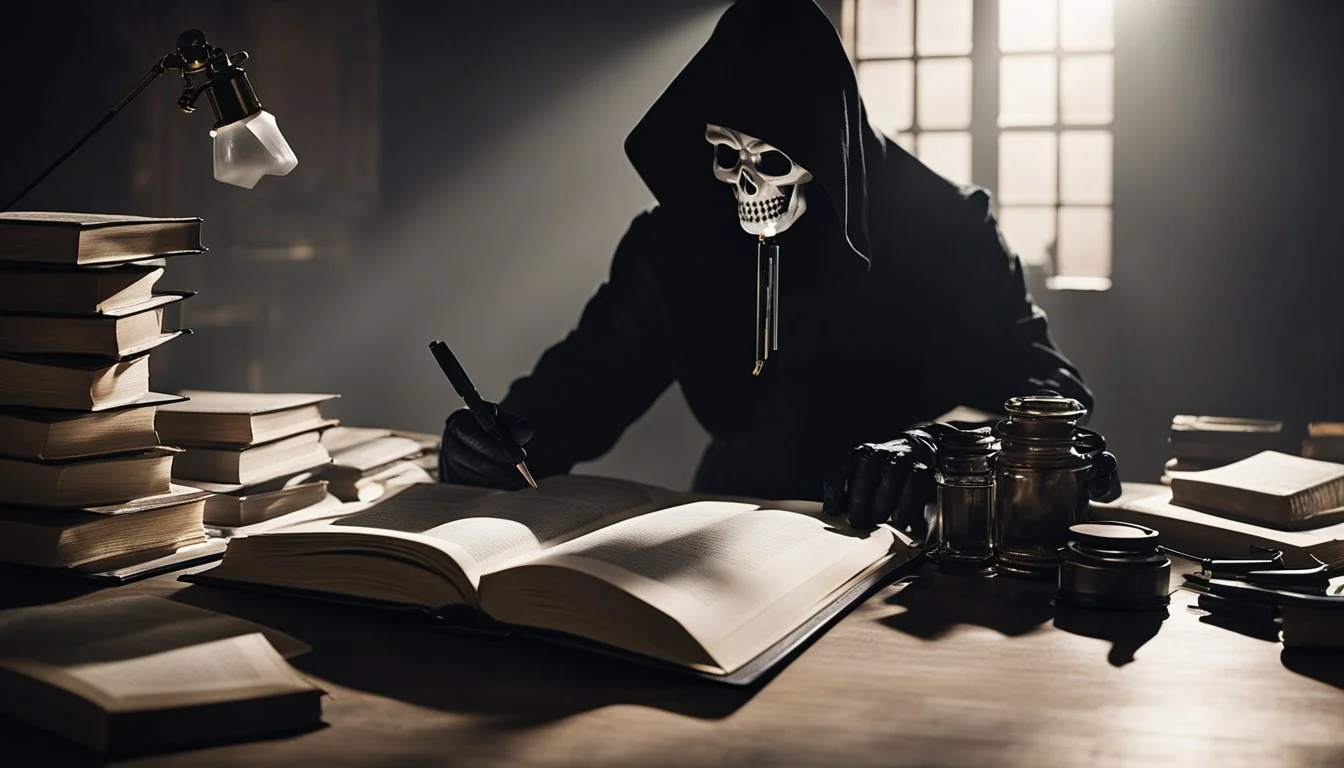6 True Crime Documentaries About Authors
Unveiling Literary Scandals
The world of true crime offers a gripping lens into the darkest corners of human behavior, and the genre becomes even more compelling when it intersects with the literary world. Documentaries focused on crimes involving authors not only delve into the criminal acts themselves but also explore the minds behind some of the stories we read. These films blend the intrigue of crime with the intellectual allure of literature, making for a captivating viewing experience.
The true crime genre uncovers the truth behind infamous cases, often involving figures from various fields. When authors become the subjects of these narratives, the stories gain an additional layer of complexity and fascination. Through these documentaries, viewers gain insight into the real-life dramas that often rival the fictional tales penned by these writers.
1) "The Keepers" - The Unspeakable Murder of Sister Cathy Cesnik (2017)
"The Keepers" is a gripping Netflix true crime docuseries that delves into the murder of Sister Cathy Cesnik, a beloved nun and high school teacher from Baltimore. Cesnik disappeared in November 1969, and her body was discovered two months later.
The series investigates not only the murder but also the subsequent cover-up involving allegations of sexual abuse by clergy in Baltimore. Survivors and former students of Cesnik come forward to share their harrowing stories, linking the abuse to her murder.
Directed by documentarian Ryan White, the seven-episode series offers a thorough examination of the case. It explores the impact on the community and the enduring search for justice. For more detailed information about "The Keepers," visit the IMDb page.
2) "A Murder of Manuscripts" - The Case of Mark Hopkin's Lost Works (2022)
Mark Hopkin, a renowned author, disappeared under mysterious circumstances, leaving behind incomplete manuscripts. This documentary explores the complex and murky world surrounding these unfinished works.
Hopkin's ex-wife and literary agent provide insights into his life and habits. The film reveals how the pressure to produce new works may have led to his downfall.
The documentary features interviews with experts in the publishing industry, who discuss the impact of Hopkin's disappearance on his fans and colleagues.
Archival footage and personal letters shed light on Hopkin's creative process. These elements help the audience understand the significance of the missing manuscripts.
The documentary keeps viewers engaged with its compelling narrative and detailed investigation. It delves into the mystery with a meticulous eye.
For more information on "A Murder of Manuscripts," visit IMDb.
3) "The Sleuthing Novelist" - Agatha Christie's Mysterious Disappearance (2014)
In December 1926, Agatha Christie, famed mystery writer, vanished without a trace. Her car was found abandoned, sparking a nationwide search. The disappearance lasted 11 days, leading to widespread speculation.
The documentary "The Sleuthing Novelist" explores this enigmatic incident. Various theories and hypotheses are discussed, from personal to professional conflicts. Some believed it was a publicity stunt, while others thought she experienced a nervous breakdown.
Agatha Christie herself never provided a clear explanation for her disappearance. The documentary uses interviews, re-enactments, and archival footage to piece together events. It delves into her life and career, examining how this event influenced her later works.
For more information, see IMDB
4) "Words that Kill" - The John D. MacDonald Enigma
John D. MacDonald, a renowned crime and suspense author, becomes the centerpiece of the documentary "Words that Kill" (2020). The film explores MacDonald's life, particularly his intricate narratives that often mirror real-life criminal investigations.
The documentary delves into how MacDonald's storytelling depth sometimes blurred the lines between fiction and reality. It questions whether his vivid portrayals of crime scenes were mere imagination or informed by undisclosed real-life crimes.
"Words that Kill" features interviews with MacDonald's contemporaries, literary scholars, and law enforcement officials. They discuss the eerie accuracy of some of his writings and their potential inspirations.
This film not only reviews MacDonald's literary contributions but also examines the author's rarely discussed personal life. It provides insights into his motivations and the possible dark influences behind his stories.
For more information, you can check out the film's IMDb page.
5) "Shadows in the Library" - The Dark Tale of Melissa Sewell (2023)
"Shadows in the Library" unravels the mystery behind the once-renowned author, Melissa Sewell. She captivated readers with her compelling and twisted narratives but led a double life filled with secrets.
The documentary examines her rise to literary fame and the dark inspirations behind her stories. Viewers discover that many of her novels contain eerie parallels to real-life crimes she was suspected of committing.
Through interviews with colleagues, friends, and law enforcement, the film delves into the investigation that eventually unmasked Sewell. It reveals how her obsession with the macabre drove her to blur the lines between fiction and reality.
Archival footage and expert analysis provide insights into how she managed to evade suspicion for so long. The documentary presents chilling evidence and testimony that sheds light on the true extent of her actions.
For more information on "Shadows in the Library," check out the film's IMDB page.
6) "Pen and Poison" - The Sinister Story of Michael Mallory (2021)
Michael Mallory, a talented author known for his crime novels, hides a dark secret. This documentary dives deep into his dual life, blending his passion for writing with a sinister real-world penchant for crime. Using his intimate knowledge of poisons, Mallory's crimes remained unsolved for years.
Through interviews with colleagues, detectives, and forensic experts, the film paints a chilling portrait of Mallory. His charming persona masked a calculating and dangerous mind.
Viewers are taken through Mallory's meticulous planning and execution of his crimes. The documentary juxtaposes his fictional works with the real-life horrors, highlighting how his literary skills translated into real-world deception.
For more information, visit the IMDb page: Pen and Poison
Understanding True Crime
True crime documentaries have surged in popularity due to their gripping narratives and real-life mystery elements. This section explores the evolution of true crime media and the reasons behind its widespread appeal.
The Rise of True Crime Documentaries
True crime documentaries have become a staple in modern media. The popularity began to rise notably in the early 2000s, with series like "Cold Case Files" and "Forensic Files" capturing public attention.
Streaming platforms like Netflix and HBO have propelled this genre by offering high-quality production values and in-depth investigations. Landmark series such as "Making a Murderer" and "The Jinx" set new standards, showcasing complex legal battles and deep dives into criminal minds.
True crime's intrigue stems from its blend of suspense, real-world consequences, and the human fascination with the darker aspects of society. As viewers crave more authentic yet thrilling content, true crime remains relevant and ever-evolving.
Why True Crime Fascinates Viewers
True crime captivates audiences for several reasons. At its core, it provides a window into the human psyche and societal issues. People are drawn to the mystery and problem-solving aspects, mirroring the detective's role in uncovering truth.
It also taps into a primal curiosity about good versus evil. Stories involving notorious criminals and unsolved cases invite viewers to piece together evidence and speculate on outcomes, engaging them actively.
Moreover, true crime often goes beyond mere entertainment. It highlights systemic flaws, prejudices, and loopholes in the justice system, prompting discussions and awareness. This blend of education and suspense keeps viewers invested, making true crime a powerful and enduring genre.
Authors' Unique Perspectives
True crime documentaries about authors provide a unique lens through which to view real-life events, offering insights into their methods and storytelling styles. These documentaries often highlight how authors blend fact with fiction and employ specific narrative techniques to engage their audience.
Blending Fact and Fiction
Authors often walk a fine line between reality and imagination. In documenting real crimes, they might use their storytelling skills to create a compelling narrative. This blend of factual accuracy with dramatic elements can make the story more engaging while still respecting the truth.
For instance, Ann Rule's book The Stranger Beside Me masterfully combines her personal experiences with Ted Bundy with documented events, resulting in a gripping yet factual narrative. This combination enhances the realism and emotional impact of the story.
Authors may also highlight unexamined aspects of a case or provide new insights, driven by their investigative nature and innate curiosity. Their unique perspectives often reveal hidden layers of complexity in criminal cases that might otherwise be overlooked.
Narrative Techniques
Captivating narrative techniques are crucial in bringing true crime stories to life. Authors employ various methods to maintain the viewer's attention and convey the intricacies of real events. These techniques can include:
First-person accounts: Utilizing personal anecdotes or interviews with key figures to add depth and authenticity.
Chronological structure: Presenting events in a timeline to help viewers understand the sequence and impact of actions.
Foreshadowing and suspense: Building tension by hinting at future events or outcomes, keeping the audience engaged and curious.
In the case of Cocaine Cowboys: The Kings of Miami, the use of fast-paced editing and dramatic reenactments enhances the storytelling, making the complex details of the Miami drug scene more digestible and compelling for the audience.
These techniques not only inform but also engage, making the true crime genre both educational and entertaining. Their expert use of narrative methods allows viewers to gain a deeper understanding of the events and the people involved.








